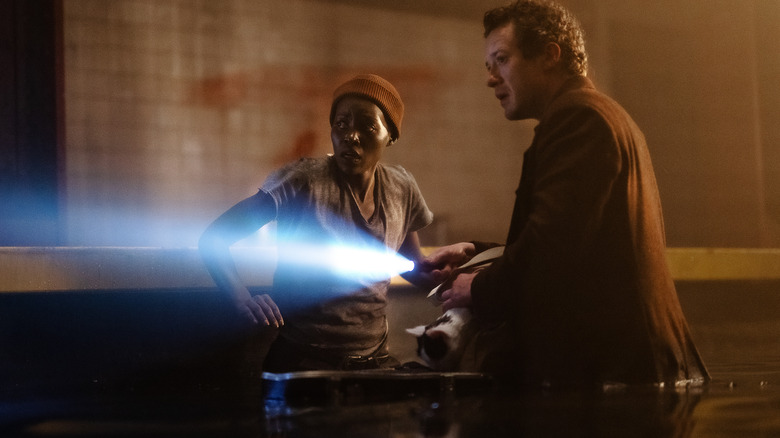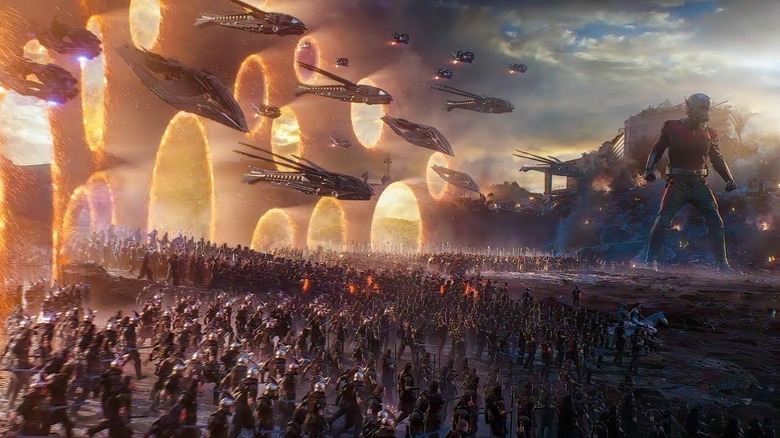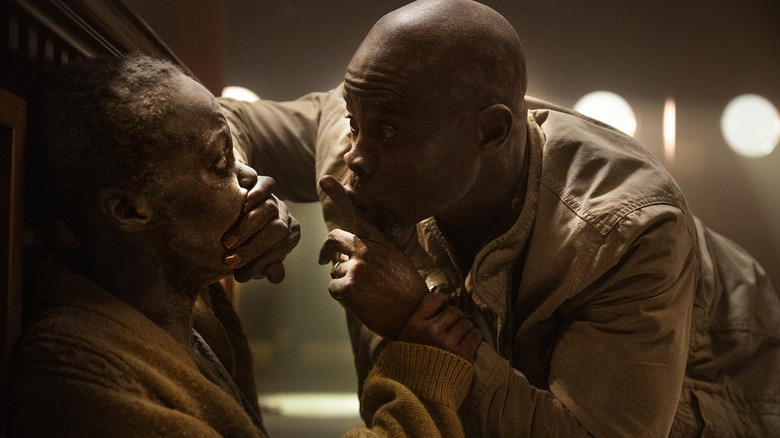A Quiet Place: Day One Pulls Off One Thing Marvel Has Always Tried To Do
Keep it down, please! This article contains mild spoilers for "A Quiet Place: Day One."
When we first found out that "A Quiet Place: Day One" would be the next film in this franchise, reactions were split. On one hand, nobody ever asked for a prequel film detailing how the series' alien invasion first went down; it couldn't help but feel like the very definition of an unnecessary origin story, which the two John Krasinski-directed movies before it had already covered through flashbacks. On the other, the subsequent news that Jeff Nichols (whose latest critically-acclaimed film, "The Bikeriders," is currently playing in theaters) would be directing helped make it feel like somewhat less of a blatant cash grab and more like an opportunity for an interesting talent to take a big swing on a blockbuster budget. Once he parted ways with the production, however, it was easy to dismiss the entire enterprise and expect the worst ... even after "Pig" director Michael Sarnoski came on board to write and direct this third installment.
But reviews (including our very own by /Film's Chris Evangelista) have been exceptionally strong, box-office tracking seems poised to outpace expectations, and it's all resulted in a sterling example of franchise filmmaking done right. Now, most well-adjusted moviegoers won't end up comparing this self-contained horror experiment to the very different Marvel Cinematic Universe but, for better or worse, I'm not well-adjusted in the least. After seeing how Sarnoski imbued this IP expansion with genuine heart while putting his own recognizable stamp on the series, it dawned on me that "Day One" may have accomplished what the Marvel juggernaut never quite managed to pull off. In effect, "A Quiet Place" might've just proven itself as the director-friendly safe haven we all expected the MCU to be.
Cogs in the Marvel machine
Remember when many hopeful film nerds thought that the MCU would be the perfect launching pad for up-and-coming filmmakers to make a name for themselves, put their own twist on formula, and position themselves for greater things to come? To paraphrase a famous line from "The Avengers," there was an idea to bring together a group of the most promising storytellers — the Taika Waititis, the Chloé Zhaos, and the Nia DaCostas of the film world — so they could help lend an air of legitimacy to Marvel movies while further establishing themselves as household names. Ideally, Kevin Feige would give them just enough leeway to bring a certain flavor to each film ... without straying too far outside the all-important confines of the superhero sandbox, of course. In exchange, the post-Marvel bump would (theoretically) give them an easier time following Christopher Nolan's "One for me, one for the studio" approach. It was a win-win.
The reality, however, proved quite different. For every success story like James Gunn or Joss Whedon (both of whom never actually left the superhero scene upon joining the MCU, notably), we had countless instances where auteurs and other opinionated artists were simply unable to mesh with the demands of a shared universe: Edgar Wright, Patty Jenkins, Scott Derrickson, and Ava DuVernay, to name just a few. And even when filmmakers like Jon Favreau or Joe and Anthony Russo or Jon Watts delivered hits and worked well enough with Feige to keep coming back for more, it could be argued that the lack of any discernible personality in their directing is precisely why they fit in so well.
In the end, the MCU did the exact opposite of what movie lovers hoped it would.
Michael Sarnoski used A Quiet Place to make some noise - and a statement
And then there's "A Quiet Place: Day One." Granted, there's no avoiding the optics of Michael Sarnoski following up his small-scale, poignant, and wonderfully personal indie darling "Pig" with a prequel offshoot to an original hit movie that has since become a franchise rather than with another original passion project. That's simply a symptom of the studio system we live in these days, where no executive in their right mind would dream of leaving money on the table and even the most exciting artists are faced with ever-dwindling options if they want to get any movie made. No matter how you look at it, the quality and financial success of "Day One" only adds further credence to the claim that reboots, sequels, and prequels to preexisting IP rule the day.
That's not to say that there isn't any room for nuance within those margins, however — "Day One," after all, is living proof of that. Though far from a guaranteed Marvel-sized hit, nobody would've blinked twice if Sarnoski threw his hands up, mailed in a serviceable enough effort, and cashed his checks. Instead, he found a way to thrive inside the lines of what Krasinski dictated for "A Quiet Place." It's not necessarily an insult to point out that these films contain a certain repetitive formula, mind you. That only makes it all the more impressive that, where Krasinski struggled to reach the same heights in "Part II," Sarnoski crafted another intimate, emotional tale about finding human connection through food.
Will future "A Quiet Place" movies remain fertile ground for other directors to leave their unique fingerprints on the franchise? Will Sarnoski parlay this achievement into another original like "Pig"? We can certainly hope so. If any franchise is positioned to live up to such potential, it's "A Quiet Place."
"A Quiet Place: Day One" is currently playing in theaters. "Pig" is also available to stream on Hulu and Kanopy.


